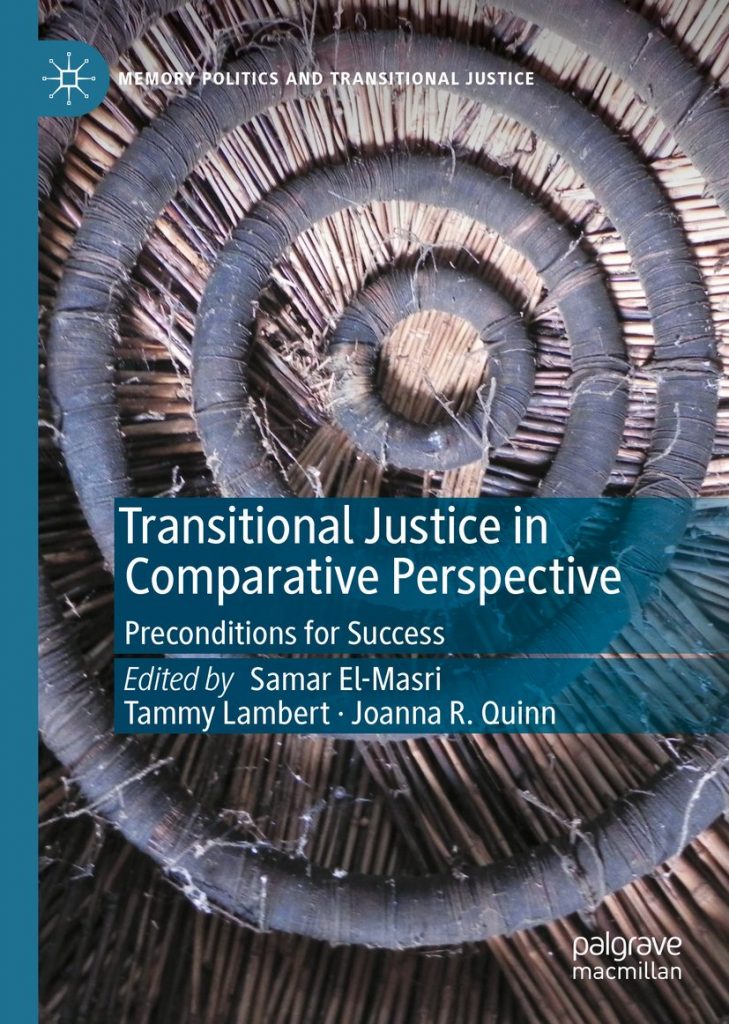El-Masri, Samar; Tammy Lambert; Joanna Quinn (Eds.). (2020)
Palgrave
By Luis Ángel Gasca Triviño, Undergraduate Student, Institute for the Study of Human Rights, Columbia University Fellowship student at EUROM (2020)
Transitional Justice in Comparative Perspective: Preconditions for Success, edited by Samar El-Masri, Tammy Lambert and Joanna Quinn, is a volume of individual country case studies focusing on the societal and institutional preconditions that contribute to the effectiveness of transitional justice measures. The case studies span conflicts of various lengths and degrees of violence, including those in Colombia, the Democratic Republic of the Congo (DRC), Gambia, Lebanon, Palestine, and Uganda. Contributors include specialists in economic development, political science, transitional justice, data science, anthropology, among others. This diverse collection serves as an opportunity to analyze general procedures in transitional justice such as amnesties, truth commissions, and tribunals within the context of specific lenses and regions.
Though existing literature highlights the importance of implementing transitional justice that contextualizes specific conditions across regions, this volume provides concrete examples and data relating to the degree of efficacy of these measures in their specific countries. The editors of this collection recognize its potential as a comprehensive foundation for transitional justice professionals and scholars to expand our understanding of how certain preconditions can be established at a sociocultural and institutional level for individual country case studies beyond those addressed within the volume.
The preconditions, also described as “ameliorating factors,” include cultural diplomacy, judicial education, language used in peace agreements, microcredit incentives for disarmament, democratic uncertainty, among others. Chapters on democratic uncertainty (i.e. cultivating trust in the prospect of greater democratic agency), the changing use of “victimhood” within Colombia’s peace agreement, and the necessity of microcredit schemes in the DRC as a means of demobilization together demonstrate the comprehensive nature of the volume by validating and qualifying the notion of “uncertainty” after conflicts.
Chapter 3 serves as a foundational discussion of democratic uncertainty, written by a political scientist specializing in democratization, Peter A. Ferguson. His conclusion that people determine their commitment to transitional justice based on how accessible democratic institutions become, aside from any initial political or socio-economic benefit, reveals the significance of these reliable democratic institutions for sustainable peace and development. This generalized trend noted in societies transitioning from authoritarian regimes is later validated by the Colombian case study on the language analysis of the peace agreement. This language analysis revealed the prevalence and expansive definition of “victim” and “victimhood” in the conflict. Though this is not directly related to greater democratic accessibility, expanding the definition of who is considered a victim, allows future citizens to claim certain protections and entitlements as victims even if their particular intersectional victimhood is not addressed explicitly today. Regardless of other economic and political factors affecting the execution of the peace agreement, this open-ended definition of victims within the armed conflict was meant to garner support from a greater portion of the population, that is, by giving those whose grievances were not redressed, an opportunity to establish their particular claims in the future. On the other hand, the Congolese case study qualifies the general benefits of structured uncertainty, as was the case in Ferguson’s analysis and in the Colombian peace agreement. Regardless of future prospects of justice or expanded civil rights, the DRC’s established economic dependence on the continuation of war necessitated greater initial financial incentives in the form of microcredits to promote demobilization. Even if the principles behind democratic uncertainty and other institutional preconditions may have been helpful in strengthening the DRC’s transition, its particular economic reality warranted a discussion of this more pressing issue and ameliorating factor.
In general, the different chapters do not contradict each other, rather they highlight how scholars can investigate the efficacy of established transitional justice procedures within these social, economic, and political factors. By using conflicts of different characteristics and regions, it allows scholars to continue the conversation of the ameliorating factors that were present or absent in other conflicts, possibly determining their effectiveness and the longevity of peace and reconciliation.
